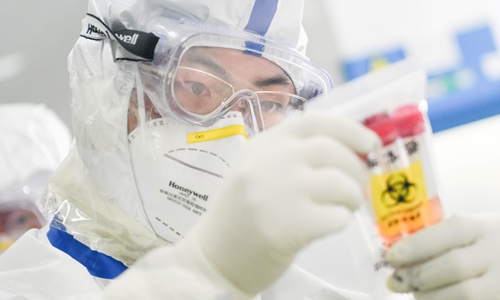HOME >> OPINION
The New York Times and Chris Buckley misrepresent China’s efforts to defeat the coronavirus
Source:Global Times Published: 2020/2/14 18:58:40

A staff member works in a laboratory in Wuhan, central China's Hubei Province, Feb. 13, 2020. As a designated service provider of nucleic acid detection of the novel coronavirus, KingMed Diagnostics laboratory in Wuhan conducts non-stop detection service and detects over 2,000 samples from various cities in Hubei Province every day. (Xinhua/Cheng Min)
While China is mobilizing all resources available in the battle against the novel coronavirus pneumonia (COVID-19), the New York Times has been busy hyping a public opinion storm by pulling rumors out of a hat in an attempt to defame China and spread overpowering fright over the epidemic.
There are few stories about recovered patients, heroic efforts by medical workers and emergency hospital builders in China to be found in the New York Times reports. Yet one can easily sense its bias through its serial news coverage on the COVID-19, with accusations such as "in Wuhan, the first concern is the humanitarian plight," "China's leader commands coronavirus fight from safe heights," and describing China as a "disease incubator."
The New York Times has always been a base camp of liberalism in the US. It has shown its long-term prejudice against both people and countries with different values via reports based on its own ideology.
Over the past decade, the rise of China has time and again proved the New York Times logic as hypocritical and unsustainable. The newspaper's panic, anxiety and dissatisfaction with China have been incisively and vividly shown in quite a few reports, be it news coverage before the 18th National Congress of the Communist Party of China (CPC) or those about China's reforms and transformation in various sectors after the congress, or the Belt and Road initiative. Those stories also mirrored the newspaper's white supremacy, racism and Western superiority.
It is thus not surprising that the New York Times showed no sympathy toward the Chinese people during the epidemic, yet such behavior can be argued as anti-human. More importantly, the New York Times reports are filled with biased viewpoints about "China's governance failure" to discredit the country under the leadership of the CPC.
One of the pioneering journalists who wrote those stories is Chris Buckley, who has been based in China for years. During his engagement and interactions with Chinese society, there have been some bumps on the road due to ideological divergences. His reports reflect that the obstacles he met have turned into an ideological shackle in his mind, which he can hardly break through. Therefore, the ideological slant can often be found in his news coverage.
At the same time, the New York Times' credibility is dropping sharply. Take the COVID-19. Related New York Times articles have met some queries from internet users. Some pointed out that many quotes in the articles concerned individuals, but few to none focused on the common good, calling it a good example of lopsided American ethics.
Given its declining credibility and the fact that the newspaper only represents the view of some, not all, Americans with a liberal stance, the New York Times has only a limited influence on its readers, both at home and abroad. The paper impacts neither China-US relations nor China's collaboration with the international community in the fight against COVID-19.
Countries across the globe are showing sympathy toward China for the epidemic. This is the mainstream trend. Their understanding and recognition of China's strong will and measures in the fight are also the mainstream. China can be more confident of crushing the New York Times' prejudice through its performance in the battle against the virus. In the end, facts speak louder than words.
China can also consider carrying out legal measures against the New York Times, such as charging it for spreading rumors or sending it a diplomatic note.
To some extent, the New York Times reports reflect that there will be a brutal war of words in the public opinion field between China and the US. This is another battle China has to fight apart from the war against COVID-19. It started before the outbreak of the epidemic and it will last during and after the virus is defeated.
The article is compiled by Global Times reporter based on an interview with Wang Wen, professor and executive dean of Chongyang Institute for Financial Studies at Renmin University of China, and executive director of China-US People-to-People Exchange Research Center. His latest book is Great Power's Long March Road. wangwen2013@ruc.edu.cn
RELATED ARTICLES:
Posted in: VIEWPOINT